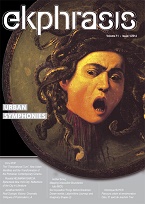Eminescu’s Short Prose:Urban Casting for Some Uncanny Stories
Eminescu’s Short Prose:Urban Casting for Some Uncanny Stories
Author(s): Roxana PatrasSubject(s): Literary Texts
Published by: Universitatea Babeş-Bolyai, Facultatea de Teatru si Televiziune
Keywords: outskirts; cathedral; miniature; white house; temple; architecture; cityscape; Realism; upward mobility; Gothic; uncanny
Summary/Abstract: Discretely polemical towards G. Călinescu’s view on Mihai Eminescu’s genuine ‘rurality’, Ilina Gregori has already shown that the courses he attended in Berlin moved the artist’s eye from countryside to town experiences; as a matter of fact, the poet’s sojourns in two imperial capitals (Vienna and Berlin) left a ‘cityscape’ equation in his writings, which also altered his former literary projects. Among these changes, Ilina Gregori mentions the bitter resignation on his playwright ambitions and, conversely, Eminescu’s virtual endorsement of prose. Thus, the poet’s turn to uncanny shortstories and sketches (Sărmanul Dionis, Cezara, La aniversară), or to perplexing novel schemes (Geniu pustiu) must bear the trace of an identity shift: for Eminescu, it was not theatre but prose-writing the genre that must have seemed the best tactic to draw the attention of the bourgeois public from the flourishing Romanian cities. Placed in-between the poles of slum-like Bucharest and idyllic Iaşi, narrating urbanity comes in line with the artist’s conversion to city-life and habits. Similarly, the famous friendship with Creangă and Slavici (both of them professed ‘countrymen’) can give the true measure of Eminescu’s new urban identity.
Journal: Ekphrasis. Images, Cinema, Theory, Media
- Issue Year: 11/2014
- Issue No: 1
- Page Range: 126-142
- Page Count: 17
- Language: English

